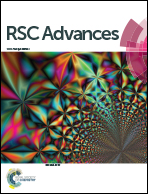Fluorinated polyhedral oligomeric silsesquioxanes†
Abstract
A series of fluorinated polyhedral oligomeric silsesquioxane (POSS) derivatives were prepared via hydrosilylation reaction and they were characterized by 1H, 13C, 29Si and 19F nuclear magnetic resonance (NMR) spectroscopy and elemental analysis. The thermal stability of POSS derivatives was studied using thermogravimetric analysis (TGA) and they exhibited high decomposition temperatures ranging from 327 to 380 °C in air and inert atmosphere. At ambient temperature, fluorinated POSS (FluoroPOSS) compounds 3a–b and 3d–e appear as fluidic oils with a dynamic viscosity of 140–430 mPas and it is noteworthy to mention that 3a, 3d and 3e do not solidify even below −80 °C. The thermal aging experiments of these FluoroPOSS oils were performed, and results revealed that these oils exhibited excellent long-term thermal stability with minimal weight loss over 48 hours in air, rendering them as promising lubricant candidates for unique applications in a wide temperature range from −80 to 300 °C. These fluorinated POSS derivatives have also shown potential in polymer surface modification as evidenced by the great increase in water contact angle from ∼68° for a neat hydrophilic PMMA film to 94–105° for the blended film with 5 wt% fluorinated derivatives. The rise in water contact angle is likely to be due to migration of the hydrophobic POSS core from the interior to the surface, which has been observed by atomic force microscopy (AFM).


 Please wait while we load your content...
Please wait while we load your content...